HDSCS Annual O & R Workshop
Education, Food, and V.I.P. Visits

(More photos below)

HDSCS put on its Orientation and Review Workshop every winter to provide a full day of intensive training for members. For many years it was at Orange County's Emergency Operations Center (EOC) atop Loma Ridge, east of the City of Orange. In recent years, it has been in the Schilling Training Center at Care Ambulance's division headquarters in Orange. The 2018 workshop took place on Saturday, March 24 at Care Ambulance.
The annual workshop often included visits from hospital representatives and from city, county, state and national officials to recognize HDSCS for its volunteer service to medical facilities in the county. In addition to addressing the workshop, these VIPs could tour the EOC, Sheriff's dispatch, 911 answering point and HEAR/ReddiNet Central Point when the workshop was atop Loma Ridge.
Scroll down to read about our workshops through the years.
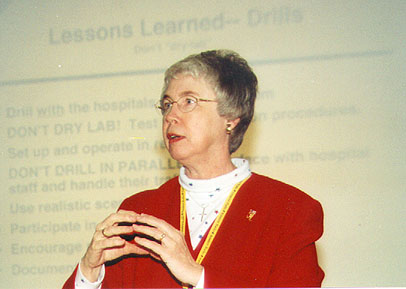
HDSCS Coordinator April Moell WA6OPS organizes the annual workshop and is the primary instructor.
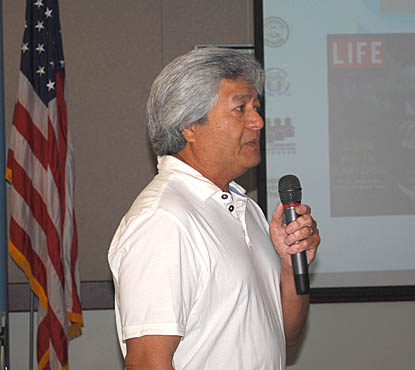
Dialysis was the topic of a special presentation in the 2018 workshop by Danilo Concepcion, CBNT, Operations Manager of Renal Services at St. Joseph Hospital.

In 2016, participants learned about the Hospital Incident Command System (HICS) from the perspective of an Incident Commander. Presenting was Gregory Landers KE6DAN, the Executive Director of Support Services at Long Beach Memorial Hospital and Miller Childrens Hospital.
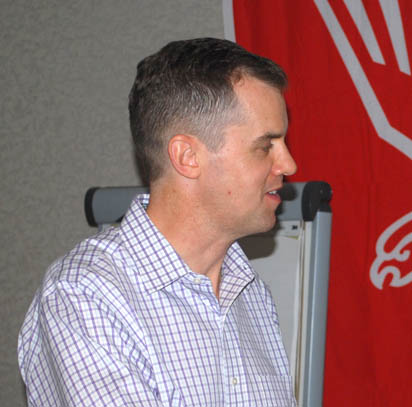
In 2015, Mike Noone, Region I Disaster Medical Health Specialist for the California Office of Emergency Services, gave an overview of his office, including Medical and Heath Situation Reports. Afterwards, he received a HDSCS challenge coin.

In 2014, Delia Kraft KF6UYW, the county's Emergency Communications Manager, gave an overview of public safety communications in the county during normal and disaster situations.
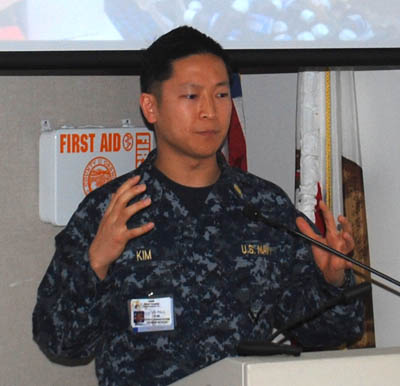
Lieutenant JG Paul Kim visited from Naval Hospital Camp Pendleton in 2014 and told the group about the new 500,000-square-foot hospital that had just opened on the base, replacing a hospital that was built in 1974.
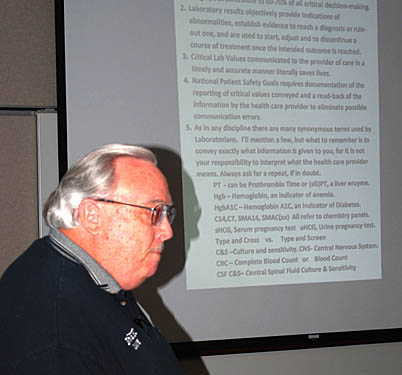
Starting in 2013, the group got information about communications for hospital laboratories from Dave West KI6EPI, Director of Laboratory and Cardiopulmonary Services at College Hospital in Costa Mesa.

Beginning in 2009, a module was added to cover modern Amateur Radio VHF/UHF transceivers and their operation in hospitals. It's presented by Tom Gaccione WB2LRH.
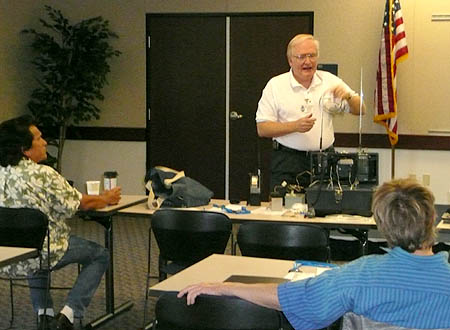
Joe Moell KØOV gave a talk each year on "go-kits" and personal preparedness.
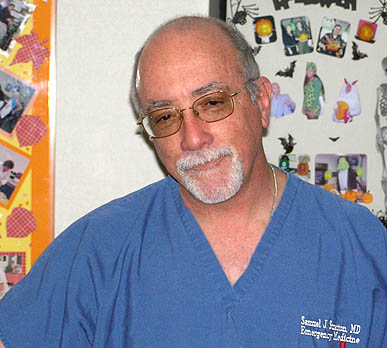
Dr. Samuel Stratton W5AGX, the Medical Director for Orange County Emergency Medical Services Agency, presented information about his agency, the hospital environment and the Orange County Mass Casualty Plan. In 2015, his talk was about evacuation of hospitals.

The "Life Without Full Duplex" lecture by Michael Scofield N6OKG was an almost-annual favorite.
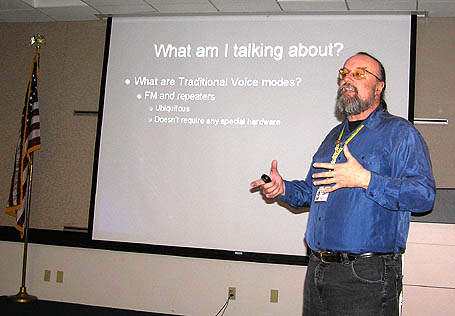
Dennis Kidder W6DQ gave a new presentation on non-traditional communications modes in 2009.
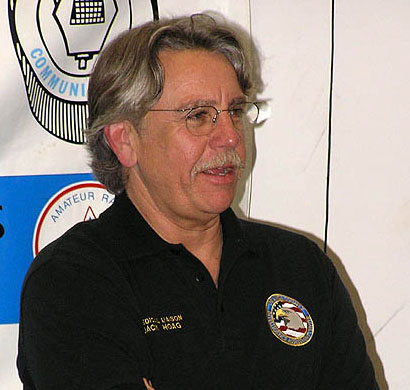
Medical Liaison Senior Program Manager Jack Hoag discussed the Orange County Intelligence Assessment Center at the 2008 workshop.
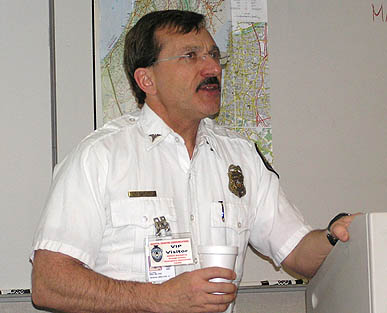
Presenting the START system for triage module in 2006 was Dr. Ken Miller, who is Medical Director of Orange County Fire Authority and Assistant Medical Director of Orange County Emergency Medical Services Agency.
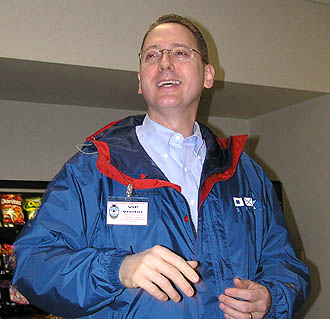
In 2006, our VIP visitors included Chuck Devore, Member of the California State Assembly, representing District 70 in Orange County.
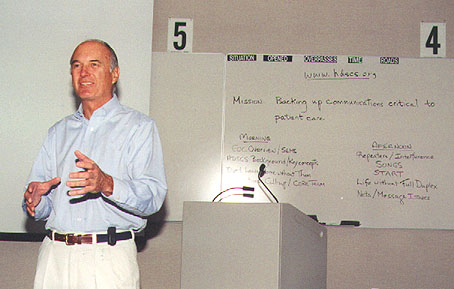
California State Senator Dick Ackerman (33rd District) addressed the workshop in 2002 and 2003.
Excerpt from remarks by California State Senator Dick Ackerman:
"I know how valuable you folks are. When I was on the city council of Fullerton, we got FEMA training for a mock disaster and there were representatives from your Fullerton RACES group there. I realized very quickly how important are the actions you folks take in communications, and how important you are to the overall system when everything goes down. I commend your activities. You're one of those groups that aren't well known out there, but I admire the work you do and I know how valuable you are to our emergency operations. After 9/11, I think everyone is taking a different look at how we respond to emergencies, and that makes your role even more important. I want to let you know that many of us appreciate the free time that you folks put in to help out in these situations."
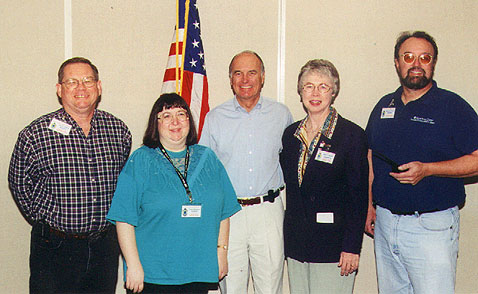
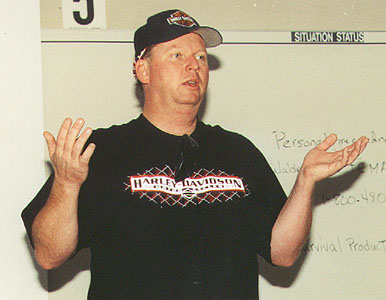
Mark Murphy, Mayor of the City of Orange, took time away from a motorcycle rallye to address the workshop in 2003.
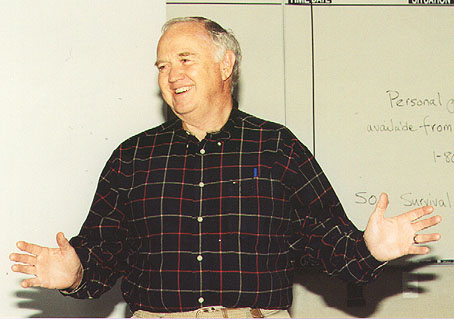
The Honorable Bill Campbell was a visitor in 2003 and 2004, when he was Chair of the Orange County Board of Supervisors. In 2005, he returned to present a Supervisors' proclamation in celebration of the HDSCS 25th anniversary.
Excerpt from remarks by Orange County Supervisor Bill Campbell:
"Thank you for giving me the opportunity to see the Loma Ridge EOC and thanks for all you do for our people and for our hospitals. As the Board of Supervisors, we just sent a letter to our President in support of his efforts on anti-terrorism. We listed in it a number of things we do as a county to prepare and be prepared for disasters, in this case due to terrorism but it goes on to other areas. We cited the fact that Mike Carona is the only Sheriff in the nation on the Homeland Defense Advisory Council of the federal government. We have great coordination among our sheriffs, our police officers, the fire departments, the private sector and personal volunteers such as you. We also mentioned the hospitals and ambulance services. Although we didn't mention your group by name, you were there in a general way. Of course your focus is broader than just the anti-terrorism effort --- you respond to natural disasters and accidents too. I know that hams provide additional services, such as communications for servicemen and their families. It's all important, I very much appreciate it and I know that the people of Orange County appreciate it, too."
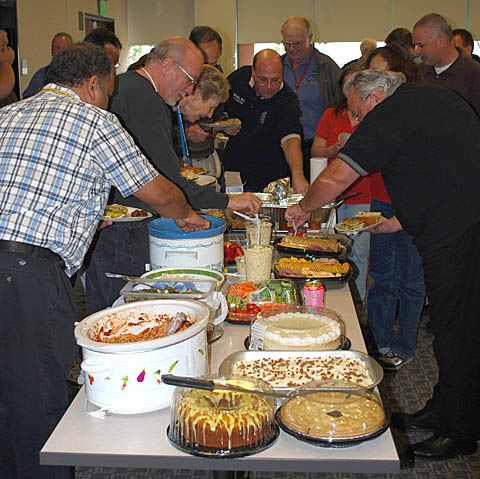
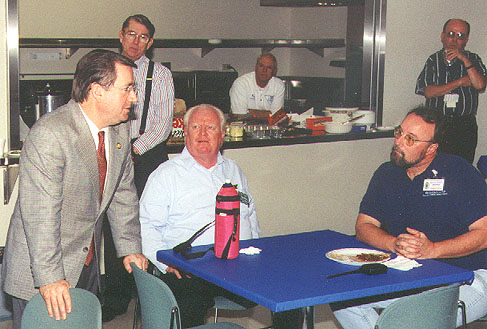
U. S. Congressman Ed Royce addressed the 2002 workshop group one year at lunchtime. In this photo, Congressman Royce (left) chats with HDSCS members (left to right) Paul Broden K6MHD, Richard Thompson WA6NOL, Ray Rittenhouse KF6WZN, Dennis Kidder W6DQ, and David Mofford W7KTS.
"Thank you for everything you do in tactical communications. Believe me, I have a real respect for the power of Amateur Radio, especially during emergencies. We're all awakening to the fact that we need to have better emergency response, and we must be attentive to the needs of those who volunteer their time to that purpose. That was one of the reasons that we passed a bill to remove liability for those of you that are involved in this important function, to make certain that when you are doing your best in responding to an emergency, there isn't an ambulance chaser out there trying to respond to you. ... I again just want to express my appreciation for everything you do."
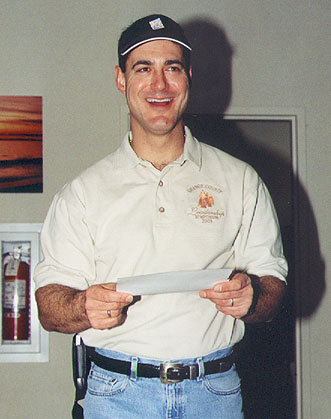
The noontime speaker in 2003 was Todd Spitzer, Member of the California State Assembly, representing District 71 in Orange County. His sister is KC6TRV.
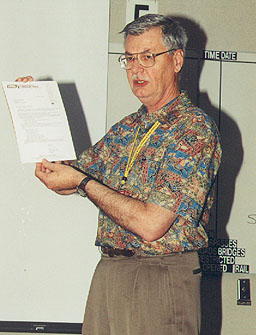
American Radio Relay League's Southwestern Division Director Art Goddard spoke to the workshop attendees in 2002 and 2003. In 2003, he presented the ARRL National Certificate of Merit, awarded by the ARRL Board of Directors eight weeks earlier.
Excerpt from remarks by ARRL Southwestern Division Director Art Goddard W6XD:
"On behalf of ARRL and everyone in ham radio, thank you for what you do. The service that you folks provide, and I know it's real from the reports I receive, provides information that ARRL needs to go to Congress and FCC to tell them that our resource, which was intended for the public interest, really is being used for the public good. That, in turn, allows ARRL to promote, protect, and grow ham radio and make sure there's a steady supply of newcomers so we can continue to do this. It's a closed cycle, so the mission of HDSCS and the mission of ARRL are sort of joined at the hip and hopefully headed in the right direction. So again, thank you for what you do."

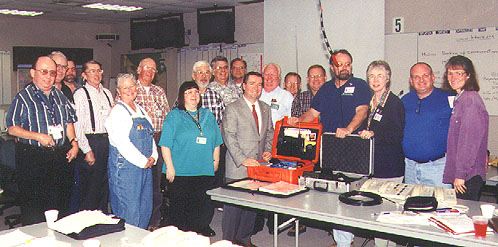
Back to the HDSCS home page
This page updated 24 March 2018